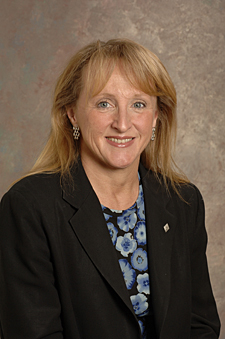Foundation Alumna Receives Prestigious NIH Award for ACL Cohort Study
Dr. Lynn Snyder-Mackler, PT, ScD, ATC, SCS, FAPTA, Alumni Distinguished Professor of Physical Therapy at the University of Delaware, began her career as a clinical physical therapist, but due to her persistent curiosity and interest in finding answers to questions, she quickly found her passion in the research side of the profession. Dr. Snyder-Mackler’s persistence has surely paid off, as she recently received a prestigious Method to Extend Research in Time (MERIT) Award from the National Institutes of Health (NIH). This award will fund her research on anterior cruciate ligament (ACL) injuries for up to ten years so that Dr. Snyder-Mackler can continue feeding her curiosity and finding answers to the many unanswered questions that she has.
Dr. Snyder-Mackler received two grants from the Foundation during the early years of her career that helped to secure the course of her research and brought her to where she is today. The first, a Doctoral Training Research Grant in 1988, funded a small randomized trial during Dr. Snyder-Mackler’s PhD studies at Boston University. This project was one of her first forays into research and it helped her to learn the basics of this type of work. The second grant, a research grant in 1991, funded a study entitled, “Comparison of Electrical Stimulation and Voluntary Exercise in Patients after ACL Surgery.” Over the years, this project continued to grow, and it is this research that eventually turned into the project for which she received the NIH MERIT award.
Dr. Snyder-Mackler’s current research focuses on how people respond differently to ACL injuries. Some people, who Snyder-Mackler calls “copers,” have the ability to stabilize themselves after an ACL injury by participating in rehabilitation, while for others, surgery may be necessary to repair the injury. By delaying surgery, those identified as copers are able to regain knee stability through neuromuscular training with a physical therapist. Her research focuses on determining how to identify these copers and how to rehabilitate them in order to make it less likely that they re-injure themselves. The study is set up as a long-term cohort and is being done simultaneously in Norway and the United States.
“In Norway, people don’t routinely get ACL surgery, so we have a chance to follow them a little bit longer than we do here,” notes Snyder-Mackler. “It gives us a longer chance to be able to figure out how well the rehab works.”
The study consists of 300 participants with injured ACLs, and with the funding from the NIH MERIT Award, Snyder-Mackler hopes to be able to follow them for up to ten years to find the answers she’s looking for.
Dr. Michael Mueller, PT, PhD, FAPTA, Professor of Physical Therapy at Washington University in St. Louis, notes that the MERIT Award shows that Dr. Snyder-Mackler’s work demonstrates superior competence, productivity, and impact.
“The NIH MERIT award places Dr. Lynn Snyder-Mackler in a category of “the best of the best”; not only in Physical Therapy research, but in all fields of clinical research,” noted Mueller. “She has spent 20 plus years developing evidence based approaches for the rehabilitation of knee injuries. It is a tremendous recognition from the federal funders for her long-standing, important research contributions.”
This award is only one in a long string of professional accomplishments that Lynn Snyder-Mackler has achieved. She has received many professional awards over the course of her career, including, most recently, APTA’s Helen J. Hislop Award for Outstanding Contributions to Professional Literature. Dr. Snyder-Mackler has contributed to over 150 peer reviewed journal articles as well as multiple book chapters and scientific and professional presentations. She has been active in APTA over the course of her career, having participated in multiple committees, special interest groups and advisory panels. Dr. Snyder-Mackler has acted as both editor and manuscript reviewer for multiple professional journals and participated in study sections and grant review panels for many funding sources, including NIH. She has played an extensive role in the development and mentorship of physical therapist students and emerging researchers. Within the Foundation, she served on the Scientific Review Committee and her reviews and feedback to applicants helped them shape future applications for funding. She has also acted as advisor and mentor to an extensive number of PhD students at the University of Delaware, many of whom are Foundation grant and scholarship recipients.
It is clear to see that Dr. Lynn Snyder-Mackler is truly a leader and a role model in her field. While she has already accomplished so much in her years as a researcher, the NIH MERIT Award is in some aspects just the beginning. Snyder-Mackler now has the opportunity to spend the next decade continuing her work, answering questions and doing what she loves.
“I love being able to find answers, even when they’re small ones and we end up with more questions,” stated Snyder-Mackler. “Life is never boring.”
Learn more about Dr. Lynn Snyder-Mackler, her research, and the NIH MERIT Award.
Select Foundation Grants and Scholarships Awarded
BERNADETTE GILLICK, PT, MSPT, PhD
